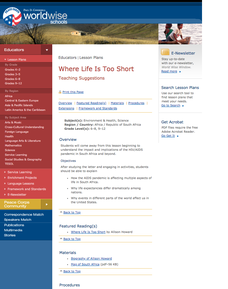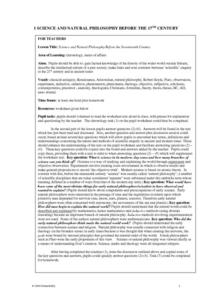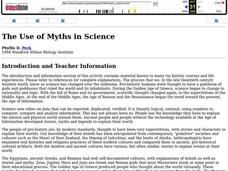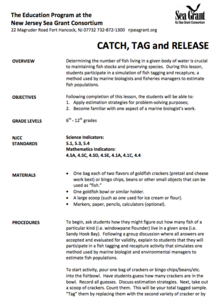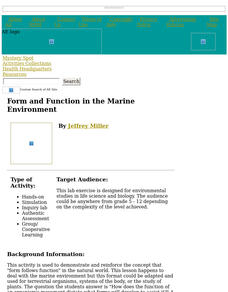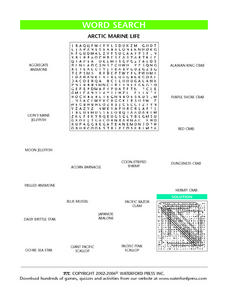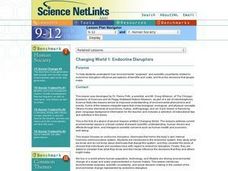Curated OER
Where Life Is Too Short
Students study the impact and implications of the HIV/AIDS pandemic in South Africa and beyond. They explain how the AIDS pandemic is affecting multiple aspects of life in South Africa and why life expectancies differ dramatically among...
Curated OER
A Bug's Life: Diary of an Insect's Metamorphosis
Fifth graders examine the stages of insect's to understand heredity. In this inherited traits lesson plan, 5th graders explore the life of the honeybee for its inherited traits. Students recognize the difference between inherited...
Curated OER
Who Am I? the Web of Life ... With a Twist!
Students are assigned a secret species identity. They identify with the help of the other players. Once all identities have been deciphered, players form a circle and, by passing a ball of yarn from "species to species", they form...
Curated OER
Human Impact on the Life Cycle of Corals
Students study the life cycle of a coral reef. They then participate in a simulated village meeting in which they roleplay various characters who must review proposed legislation dealing with reef management.
Curated OER
Life Means Water Environment
Students investigate pH levels in bodies of water and experiment with acid/base reactions. In this water and pH lesson, students observe changes in pH levels of a sample solution and observe a Bronsted-Lowry reaction. Students...
Curated OER
Marine & Aquatic Habitats Activities - Creatures in the Coral
Young scholars describe unique adaptations of organisms that live in the coral reef habitat, read various books pertaining to coral reefs and ocean life, and construct a wheel demonstrating the relationships between certain coral reef...
Curated OER
Classifying Commercial Marine Species
Young scholars investigate taxonomy. They explore some of the commercial marine species caught in Magdalena Bay and develop a classification system for presented animals.
Curated OER
Science and Natural Philosophy Before the Seventeenth Century
Students complete a worksheet about some of the natural philosophers in history. They use graph paper and create a timeline with the dates of birth and names of a list of natural philosophers. They list four questions concerning life and...
Curated OER
The Use of Myths in Science
Students examine folk tales to determine the basis for scientific myths. They demonstrate through the discussion of the folk tales that the perception of the world has changed as new information is gained. They write their own folk...
Curated OER
Catch, Tag, and Release
Learners discover how fish tagging is used by marine biologists and fisheries to estimate fish populations. Participating in a simulation, learners use estimation to determine the whole population from a small number of items.
Curated OER
Growing Plants in Science and Literature, More Than an Empty Pot
Students read The Empty Pot as an introduction to plants. In this planting lesson, students understand a sequence of events in the book and relate it to the sequence of a plants life. Students grow plants and record information in flower...
Curated OER
Life Cycle of the Drosophila Fly
Learners observe the life cycle of the Drosophila fly as well as manipulate large numbers of flies, determine the difference between the sexes, and identify the different stages of the fly's life cycle.
Curated OER
Form and Function in the Marine Environment
Students study the relationship of form and function in the marine environment.
Curated OER
Life Cycles
Using computers, Students work in small groups and progress through the roles of Explorer, Researcher, Designer, and Evaluator as they study the life cycle of plants, insects, butterflies and frogs.
Curated OER
Miller-Urey Experiment Amino Acids & The Origins of Life on Earth
Students study the Miller-Urey Experiment including its history and criticism. In this origins of life lesson students repeat this experiment to see how it works.
Curated OER
Half Life Lab
Seventh graders model radioactive decay using pennies, collect data from their model, apply scientific visualization techniques to their data and create animated models explaining the concept of radioactive half-life.
Curated OER
The Seven Characteristics of Life
Third graders investigate the characteristics of living and nonliving things. They conduct a research quest in order to identify the seven characteristics of life. Then students pick one aspect and use it to create a song meant to be...
Curated OER
Word Search: Arctic Marine Life
In this science worksheet, students examine 20 labeled color pictures of Arctic marine animals. Students locate the names of these animals in a word search puzzle.
Curated OER
Common Marine Mammals Word Search
In this marine mammal wordsearch worksheet, students locate the names of 12 common marine mammals that are hidden in the puzzle. They use the pictures and names that are shown on the page as a reference for locating the words.
Curated OER
Science NetLinks: Changing World 1: Endocrine Disruptors
Students investigate how environmental surprises and endocrine disruptors influence perceptions of benefits and costs. The decisions of science are under these type of influences and must be thought out with a definite method.
Curated OER
Periodical Cicada Survival
Students explore defense mechanisms involved in predatory/prey relationships.They engage in a discussion about predatory/prey interactions. They reflect on the life cycle and behavior of the cicada.
Curated OER
Antibiotics: Will They Work?
Students examine why antibiotics are important in everyday life. They examine the decisions that people make and how these decisions can artificially speed up natural selection in bacteria that cause infections such as group A...
Curated OER
Investigate Pine Creek!
Students are invited to become detectives in this Web-Integrated Science Environment (WISE) as they explore a local creek, its environment and ongoing status. Students participate in field trips, acquisition of data through water testing...
Curated OER
Genetically Modified Foods in Perspective
Students research the concept of genetically modified foods. The purpose of the research is to increase science content knowledge and comprehension of the controversy surrounding the subject.
Other popular searches
- 4th Grade Life Science
- Life Science Inquiry
- Life Science Vertebrates
- Life Science Experiments
- K 2 Life Science
- Life Science on Cells
- Life Science Lesson Plans
- Grade 4 Life Science
- Life Science Report Topic
- Australia Life Science
- The Life Science
- Life Science Lessons
